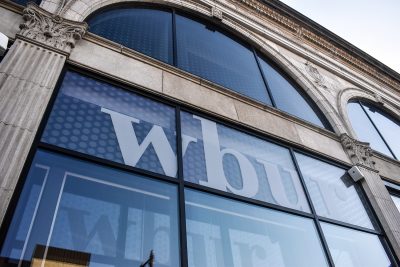While libraries, universities, museums and other educational institutions remain physically closed in Boston, venues for discussion have been moving forward online. WBUR’s CitySpace has continued to hold weekly virtual town hall briefings, including a June 23 talk entitled “COVID-19 And The Presidential Election.”

The event featured a panel of political analysts who discussed the ramifications of the pandemic and how it may impact the upcoming presidential election.
Anthony Brooks, senior political reporter for WBUR and moderator of the panel, said health care and racial tensions have gained visibility in American politics as a result of both COVID-19 and the recent resurgence of the Black Lives Matter movement.
Brooks said in an interview he believes President Donald Trump failed to address these issues at his June 20 Tulsa, Oklahoma rally, which may not bode well for his upcoming campaign platform.
Economic inequality and racial injustice have long been topics of interest in America, Brooks said. However, he believes the pandemic and current protests shone an incriminating spotlight on the severity of these issues.
“We’re at an inflection point in this country where all of these issues are suddenly becoming dominant themes and [presidential candidates] are going to have a lot to say to voters between now and Nov. 3,” Brooks said. “Voters are going to be very much focused on [these] issues.”
Brooks said he is disappointed with the manner in which the pandemic and its consequences have been handled by the Trump administration, adding that he is surprised by Trump’s failure to address issues such as COVID-19 and the resurged movement against racism and police brutality.
“I was struck by what he didn’t talk about. He didn’t really address head-on the pandemic, and the fact that in some 20 states across the country, the rate of infection is rising,” Brooks said. “One wonders what the president is hoping to base his reelection on.”
Kimberly Atkins, a WBUR senior news correspondent, said Trump seems to be unfocused on what she said are the country’s “two big issues” — systemic racism and the pandemic.
In an interview, Atkins referenced Trump’s comments about executing fewer COVID-19 tests, which she said overlook the recent spike in cases in states such as Florida and Arizona.
“[Trump] largely dismissed the threat of the coronavirus, said that he was joking when he said that he would prefer if less testing was done, not more,” Atkins said. “But he has made his calculation as to saying that the focus should be on reopening the country, and really putting aside the health risks of this pandemic.”
Panelist Shermichael Singleton, a conservative political analyst, said he thinks the president has mishandled many Republicans’s concerns regarding civil disorder stemming from recent vandalism and looting. He said this provides presumptive Democratic nominee Joe Biden a window of opportunity for a counter-response.
“I think there is a growing and expansive percent of voters that want to see solutions coming from these candidates, and I think the president, for the most part, has been able to get away with speaking in hyperbole about things without offering specificity,” Singleton said during the event. “I don’t think that’s going to work going into November.”
As the country moves toward a presidential election this November, analysts were also quick to analyze the opposing party’s campaign.
Joel Payne, a political contributor at CBS News, said that while Biden’s campaign was not particularly impressive during the primaries, time in lockdown has given the candidate an opportunity to reorganize, particularly in terms of selecting a running mate.
“If he picks a low-risk candidate, it means that Biden is going to continue to run a risk-averse campaign,” Payne said during the discussion. “If he picks somebody that’s maybe different or newer voiced, that means that Biden wants to shake it up.”
Brooks said he believes COVID-19 may influence voter turnout come November, especially after its impact on voter turnout in state primaries.
“I think [the pandemic] will keep lots of folks home, because people don’t want to line up and subject themselves to that kind of risk,” Brooks said in an interview. “This is one of the reasons why you’re seeing more and more states making a push for mail-in voting, because that’s a way to do it a lot more safely.”
Despite this concern, Payne noted record-breaking turnout in state primaries in the past few months, including those in Nevada and South Carolina — an indicator of high excitement and energy, he said.
Singleton said high voter turnout could mean a more competitive and contentious race between Democrats and Republicans, one which Biden may lose.
“One thing [that] is so reliable about Trump voters is that they will turn out and support the president no matter what,” Singleton said, “and I think that’s a concern that Democrats should have come November.”
Brooks said in an interview there are many potential variables in play that could dramatically shift the dynamics of the election, including the state of the economy, the prospects of the pandemic and the country’s reopening.
“I think if the election were held today, it would look pretty good for Joe Biden, but in politics, five months is a lifetime,” Brooks said. “Trump’s strongest case for re-election was a strong economy. If he can run on that again, then I think his chances are really good.”














